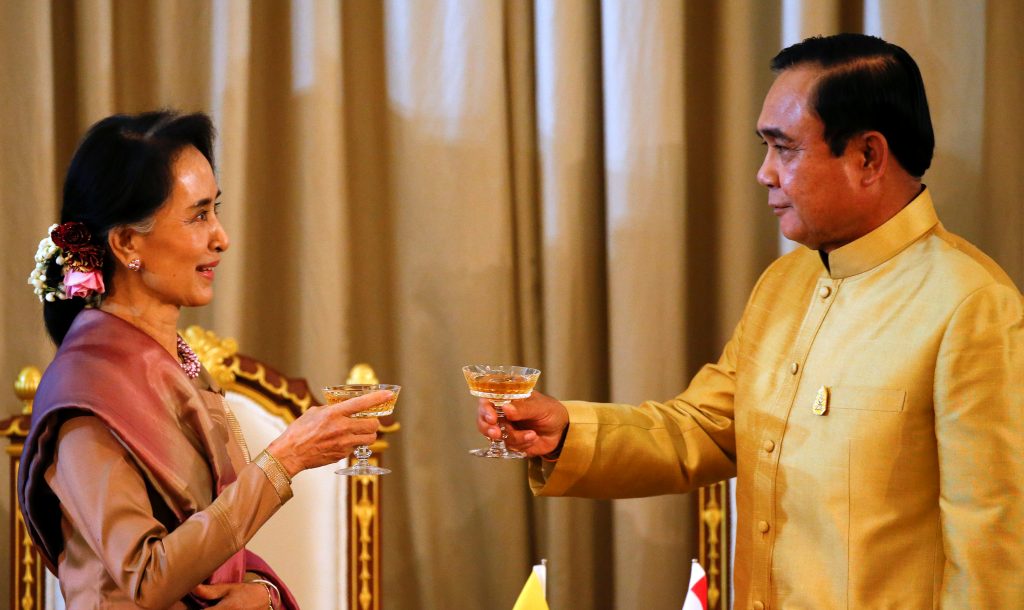This column was published in The Myanmar Times on Monday, 4 July 2016.
It says something profound about the region that Daw Aung San Suu Kyi’s first international trips as state counsellor and foreign minister have required photo ops with Southeast Asian dictators.
First up, she went to Vientiane for meetings hosted by the Lao communist party. Now she has recently returned from Thailand, where that country’s military rulers offered their gilded hospitality to Southeast Asia’s best-recognised democracy activist.
While it is tempting to dwell on the irony, the hard political reality is that Daw Aung San Suu Kyi cannot avoid a close working relationship with her Thai counterparts.
In every generation, the relationship between Thailand and Myanmar is one of the region’s most notable. In the old days it was ordinarily shaped by war, conquest and trauma.
Thai schoolchildren are not allowed to forget the sacking of their capital, Ayutthaya, in 1767 by the Konbaung dynasty’s King Hsin-
byushin. We still hear reference to the fallen capital whenever a Myanmar speaker refers to their “Yodaya” neighbours.
Even in more recent times, there have been flare-ups along the border, with pushing and shoving between security and military forces. Both sides devote a significant fraction of defence spending to their contested borderlands and to keeping an eye on each other.
Fortunately, the two countries have rarely come to serious blows. Indeed, the joint management of the borderlands has settled into a comfortable pattern. Thai security officials know their Myanmar colleagues well and have built up a level of confidence that tends to help resolve situations as they arise.
Most of the clashes along the border in the past 10 years trace their origins to the noxious mix of criminal, political and economic activities that can grow in lightly governed spaces.
In rhetoric, Thailand resents the huge flows of narcotics that cross the border from Myanmar, but it seems unable or unwilling to fix what is a persistent social problem. It is unclear whether the two countries will ever share the wherewithal to cooperatively manage such a fiendish policy conundrum.
Daw Aung San Suu Kyi’s visit last month to Bangkok illustrates the other major issues in the relationship.
At the top of the list are the millions of Myanmar migrant workers on the Thai side of the border. For the past two generations, they have done the demanding, demeaning or dangerous jobs that Thais no longer want to do. Too often, they have been paid paltry sums, commonly well below the mandated minimum wage.
Myanmar workers are also sadly the victims of much else that ails Thai society. Can the state counsellor and her team put an end to the exploitation? That would be a win for humanitarian values and for Myanmar’s new foreign policy.
Daw Aung San Suu Kyi’s success will probably be limited, though, by the links between constrained domestic and regional politics. The bottom line is that relatively stable, inter-generational elites rule both Thailand and Myanmar. They have proved effective at stomping out alternative claims to power.
In Myanmar, we still have the army in constitutional pole position, now supported by the aura of General Aung San’s unrivaled lineage.
On the Thai side, the ruling military clique claims a mandate for its authoritarian grip in defence of the royal family and its nine generations of kingly rule. Bangkok’s stop-start experimentation with democracy has ended for now.
In any toe-to-toe comparison, that means today’s Myanmar has the more open and participatory politics. Daw Aung San Suu Kyi will have pondered this curious contradiction.
However, such is the difficulty of Thailand’s internal politics, and so high are anxieties about the precarious royal succession, that Myanmar actually needs to be on guard for potential crises across the border.
These conditions present challenges for Daw Aung San Suu Kyi and her foreign policy team. They understand the crucial role that Thailand plays as a security partner for the United States in Southeast Asia. In the past, State Peace and Development Council strategists no doubt had questions about whether the US had Thailand-based assets to prepare for a showdown with Myanmar.
Thankfully, it never came to that. Now the high-tempo rehabilitation of Myanmar’s global reputation and its ongoing political transformation will change the relationship with Thailand for good.
With economic growth rates of around eight per cent, record numbers of foreign visitors and a boom in national confidence, Myanmar is an attractive place for everyone, including Thais. When my Thai friends visit Yangon, Kyaikhtiyo Pagoda in Mon State or Keng Tung in Shan State, they revel in the excitement of shared traditions and familiar cultural vibes.
At the popular level there is now a chance for creating unprecedented goodwill and interaction. Any savvy moves in that direction could also help to make Southeast Asia a more peaceful and prosperous region for the generations to come.
Nicholas Farrelly is a Fellow in the ANU Bell School of Asia Pacific Affairs at the Australian National University and co-founder of New Mandala. His column appears each Monday.
 Facebook
Facebook  Twitter
Twitter  Soundcloud
Soundcloud  Youtube
Youtube  Rss
Rss 